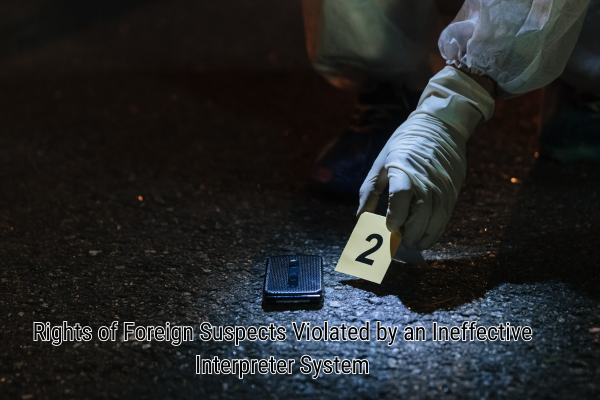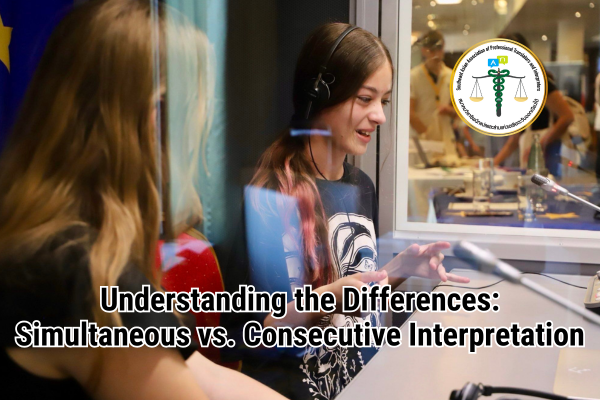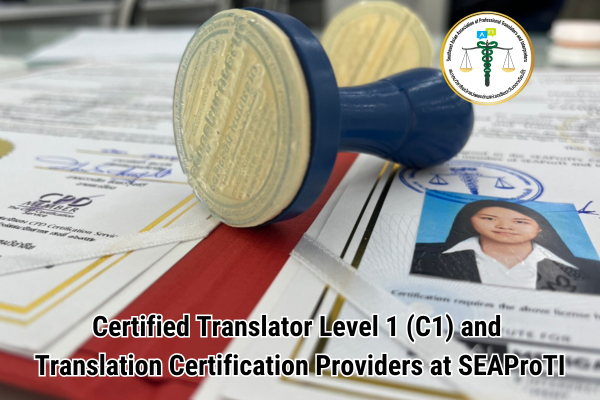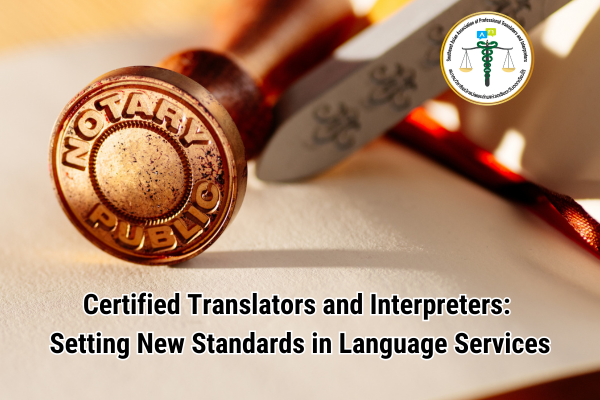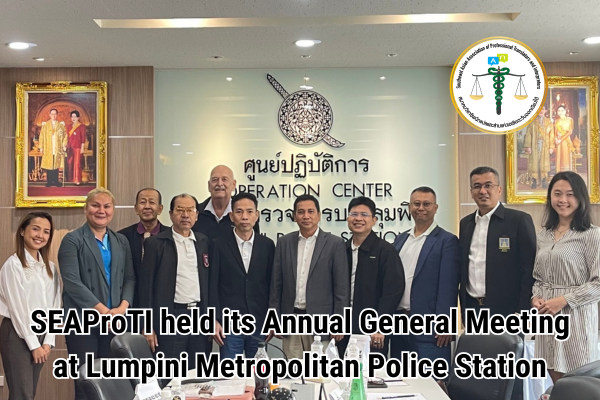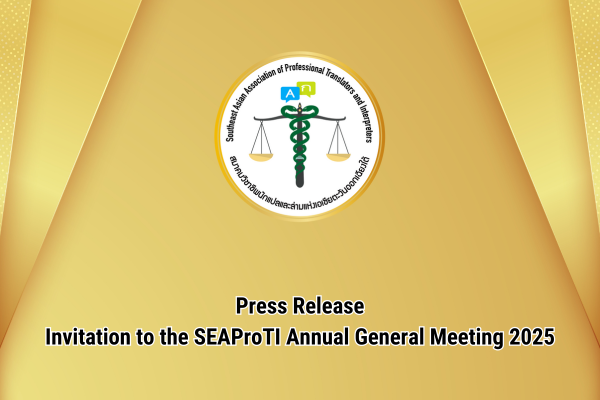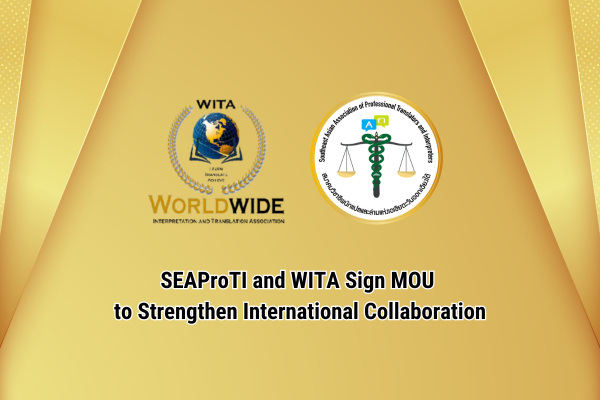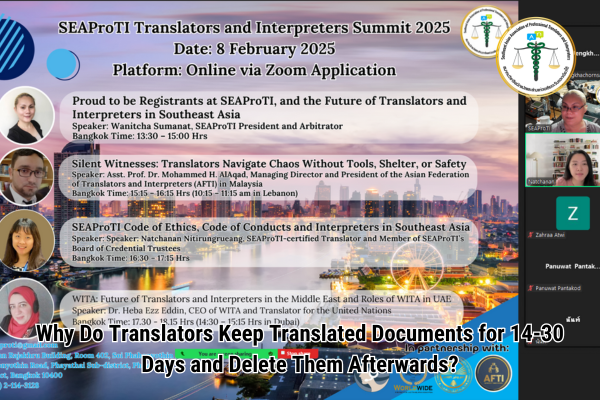The Rights of Foreign Suspects Violated by an Ineffective Interpreter System
30 October , 2024 – In 2024, the issue of rights violations against foreign suspects in the Thai justice system remains a pressing concern. These violations stem largely from the inefficiencies in the recruitment, training, and management of interpreters, which are critical components of a fair judicial process. Despite efforts by government agencies to train interpreters and allocate significant resources to improve the system, the lack of a structured and effective approach continues to undermine the rights of foreign suspects.
The Thai legal framework guarantees several fundamental rights to all suspects, including the presumption of innocence until proven guilty, the right to a prompt and fair investigation, and the right to legal representation. Suspects must also be informed of the charges against them and the reasons for their arrest in a language they understand. These principles are essential for ensuring justice and protecting human rights. However, in practice, foreign suspects often encounter significant barriers when navigating the Thai justice system due to language differences and the lack of qualified interpreters.
One of the most critical rights of any suspect is the ability to understand the legal proceedings they are involved in. For foreign suspects, this depends heavily on the availability and quality of interpreters who can bridge the language gap. Unfortunately, in Thailand, the absence of a standardized system for certifying interpreter quality often results in individuals with inadequate skills being assigned to these crucial roles. This deficiency severely impacts the ability of foreign suspects to comprehend the charges against them, communicate effectively with their lawyers, and provide coherent testimonies. As a result, their right to a fair trial is compromised.
The inability to access competent interpreters creates a range of challenges for foreign suspects. For instance, many are unable to understand their legal rights or the accusations they face, leaving them vulnerable to manipulation and unfair treatment. The communication barrier also complicates their interactions with legal counsel, which is vital for building a robust defense. In court, the lack of accurate interpretation can lead to misunderstandings, misrepresentation of facts, and ultimately, flawed judicial outcomes. Moreover, these challenges often cause delays in legal proceedings, further exacerbating the emotional and financial toll on suspects and their families.
Despite efforts by various government agencies to address these issues, the measures implemented thus far have been insufficient. Training programs for interpreters exist, but they often lack depth and fail to cover the specialized knowledge and skills required for legal interpretation. Many training sessions are short and focus primarily on basic language skills, neglecting the complexities of legal terminology and courtroom procedures. Additionally, there is no consistent mechanism for assessing the effectiveness of these training programs or monitoring the performance of interpreters after they have been deployed.
The selection process for interpreters in the justice system also raises significant concerns. In many cases, individuals are chosen based on personal connections or informal networks rather than objective criteria such as linguistic proficiency and legal knowledge. This approach undermines the credibility of the system and leads to the appointment of interpreters who are ill-equipped to handle the demands of legal interpretation. Furthermore, the lack of a centralized management system means that there is little oversight or coordination in the recruitment and deployment of interpreters, resulting in inconsistencies and inefficiencies across different regions.
The emphasis on quantity over quality is another major issue plaguing the interpreter system in Thailand. Government agencies often prioritize meeting numerical targets for interpreter recruitment without ensuring that these individuals possess the necessary qualifications and experience. This focus on quantity compromises the overall effectiveness of the system and perpetuates the challenges faced by foreign suspects. Without qualified interpreters, the justice system cannot fulfill its obligation to provide fair and equitable treatment to all individuals, regardless of their nationality or language.
The consequences of these systemic issues are far-reaching and deeply troubling. Foreign suspects who are unable to access competent interpreters face significant disadvantages in the legal process, leading to outcomes that are often unjust and discriminatory. These individuals are effectively denied their right to a fair trial, which is a cornerstone of any democratic society. The inability to communicate effectively in legal settings also constitutes a violation of their basic human rights, as it deprives them of the opportunity to defend themselves and seek justice.
The impact of these challenges extends beyond individual cases and affects the broader justice system. Delays caused by communication barriers and inadequate interpretation services contribute to inefficiencies and backlogs in the courts. This not only undermines the credibility of the legal system but also erodes public confidence in its ability to deliver justice. Moreover, the perception of unfair treatment toward foreign suspects damages Thailand’s international reputation and raises questions about its commitment to upholding human rights and the rule of law.
Addressing these issues requires a comprehensive and coordinated approach that goes beyond superficial fixes. One of the most urgent steps is the establishment of a standardized system for certifying interpreters. Such a system should include rigorous testing and accreditation processes to ensure that interpreters possess the necessary linguistic skills, legal knowledge, and professional ethics. Collaboration with academic institutions and professional organizations can help develop a robust certification framework that meets international standards.
Improving the training and development of interpreters is another critical priority. Training programs should be designed to cover the full spectrum of skills required for legal interpretation, including advanced language proficiency, knowledge of legal terminology, and an understanding of courtroom procedures. These programs should also emphasize the ethical responsibilities of interpreters, such as maintaining confidentiality and impartiality. Regular assessments and refresher courses can help interpreters stay updated on legal developments and maintain their professional competence.
The recruitment and management of interpreters must also be reformed to ensure transparency and accountability. Clear and objective criteria should be established for selecting interpreters, with a focus on their qualifications and experience. A centralized management body could oversee the recruitment, training, and deployment of interpreters, ensuring consistency and efficiency across the system. This body could also be responsible for monitoring and evaluating interpreters’ performance, providing feedback and support to help them improve their skills.
Promoting collaboration among stakeholders is essential for driving systemic change. Government agencies, legal professionals, academic institutions, and civil society organizations should work together to address the challenges facing the interpreter system. By pooling resources and expertise, these stakeholders can develop innovative solutions and ensure that reforms are implemented effectively. Public awareness campaigns can also play a role in highlighting the importance of interpreters in the justice system and advocating for their professionalization.
Ultimately, the goal of these reforms is to create a justice system that is fair, inclusive, and capable of protecting the rights of all individuals, regardless of their language or nationality. Ensuring access to qualified interpreters is not just a matter of procedural fairness; it is a fundamental aspect of respecting human dignity and upholding the principles of justice. By taking decisive action to improve the interpreter system, Thailand can demonstrate its commitment to these values and enhance its reputation as a nation that values human rights and the rule of law.
The journey toward a more equitable justice system will undoubtedly require time, effort, and resources. However, the benefits of such reforms far outweigh the costs. A well-functioning interpreter system will not only improve the experiences of foreign suspects but also strengthen the overall integrity and efficiency of the justice system. It will foster greater trust and confidence among the public and the international community, reinforcing Thailand’s position as a country that upholds justice and human rights. The time to act is now, and the stakes could not be higher.
About SEAProTI’s certified translators, translation certification providers, and certified interpreters:
The Southeast Asian Association of Professional Translators and Interpreters (SEAProTI) has officially announced the criteria and qualifications for individuals to register as “Certified Translators,” “Translation Certification Providers,” and “Certified Interpreters” under the association’s regulations. These guidelines are detailed in Sections 9 and 10 of the Royal Thai Government Gazette, issued by the Secretariat of the Cabinet under the Office of the Prime Minister of the Kingdom of Thailand, dated July 25, 2024, Volume 141, Part 66 Ng, Page 100.
To read the full publication, visit: the Royal Thai Government Gazette
สิทธิของผู้ต้องหาชาวต่างชาติถูกละเมิดจากระบบล่ามที่ไร้ประสิทธิภาพ
30 ธันวาคม 2567, กรุงเทพมหานคร – ในปี 2567 ปัญหาการละเมิดสิทธิของผู้ต้องหาชาวต่างชาติในกระบวนการยุติธรรมไทยยังคงเกิดขึ้นอย่างต่อเนื่อง โดยมีสาเหตุหลักมาจากระบบการจัดหาและบริหารจัดการล่ามที่ขาดประสิทธิภาพของหน่วยงานราชการไทย แม้จะมีความพยายามในการฝึกอบรมล่ามและใช้งบประมาณจำนวนมาก แต่ปัญหาก็ยังไม่ได้รับการแก้ไขอย่างเป็นรูปธรรม
สิทธิของผู้ต้องหาที่ถูกละเมิด
ตามกฎหมายไทย ผู้ต้องหามีสิทธิหลายประการที่ควรได้รับการคุ้มครอง เช่น สิทธิที่จะได้รับการสันนิษฐานไว้ก่อนว่าไม่มีความผิด สิทธิที่จะได้รับการสอบสวนอย่างรวดเร็วและเป็นธรรม สิทธิที่จะมีทนายความหรือผู้ที่ไว้วางใจเข้าฟังการสอบปากคำ และสิทธิที่จะได้รับการแจ้งข้อกล่าวหาและรายละเอียดแห่งการจับกุมโดยเร็ว
อย่างไรก็ตาม ในกรณีของผู้ต้องหาชาวต่างชาติ การขาดล่ามที่มีคุณภาพทำให้สิทธิเหล่านี้ถูกละเมิดอย่างร้ายแรงการละเมิดสิทธิที่เกิดขึ้น:
- ผู้ต้องหาไม่สามารถเข้าใจข้อกล่าวหาและสิทธิของตนเองได้อย่างชัดเจน
- การสื่อสารระหว่างผู้ต้องหากับทนายความเป็นไปอย่างยากลำบาก
- ผู้ต้องหาไม่สามารถให้การหรือแก้ข้อกล่าวหาได้อย่างมีประสิทธิภาพ
- การพิจารณาคดีเกิดความล่าช้าเนื่องจากปัญหาด้านการสื่อสาร
ปัญหาของระบบล่ามในกระบวนการยุติธรรมไทย
แม้จะมีความพยายามในการฝึกอบรมล่ามจากหน่วยงานราชการหลายแห่ง แต่ปัญหาหลักยังคงเกิดขึ้นจากระบบการบริหารจัดการที่ไม่มีประสิทธิภาพ
ปัญหาเหล่านี้ส่งผลให้ผู้ต้องหาชาวต่างชาติไม่สามารถเข้าถึงสิทธิของตนได้อย่างแท้จริงปัญหาหลักของระบบล่าม:
- การขาดระบบรับรองคุณภาพล่าม: หน่วยงานราชการไทยยังไม่มีระบบที่เป็นมาตรฐานในการรับรองคุณภาพของล่าม ทำให้ไม่สามารถคัดกรองล่ามที่มีความสามารถเพียงพอได้
- การคัดเลือกล่ามที่ไม่เหมาะสม: กระบวนการคัดเลือกล่ามมักไม่ได้เน้นที่ความสามารถทางภาษาและความเข้าใจในระบบกฎหมาย แต่อาจเป็นการเลือกจากความสัมพันธ์ส่วนตัวหรือเครือข่ายที่มีอยู่
- การขาดการฝึกอบรมที่มีคุณภาพ: แม้จะมีการจัดอบรมล่าม แต่หลักสูตรอาจไม่ครอบคลุมหรือไม่ลึกซึ้งพอที่จะพัฒนาทักษะที่จำเป็นสำหรับการเป็นล่ามในกระบวนการยุติธรรม
- การขาดการติดตามและประเมินผล: หลังจากการฝึกอบรม มักไม่มีระบบติดตามหรือประเมินผลการปฏิบัติงานของล่ามอย่างต่อเนื่อง
- การเน้นปริมาณมากกว่าคุณภาพ: หน่วยงานราชการอาจเน้นการจัดหาล่ามให้ได้ตามจำนวนที่ต้องการ โดยไม่ได้ให้ความสำคัญกับคุณภาพของการแปลอย่างเพียงพอ
ผลกระทบต่อกระบวนการยุติธรรม
การขาดล่ามที่มีคุณภาพส่งผลกระทบร้ายแรงต่อกระบวนการยุติธรรมในหลายด้าน:
- ความไม่เป็นธรรมในการพิจารณาคดี: ผู้ต้องหาชาวต่างชาติอาจไม่ได้รับความเป็นธรรมในการพิจารณาคดีเนื่องจากไม่สามารถสื่อสารหรือเข้าใจกระบวนการได้อย่างถูกต้อง
- การละเมิดสิทธิมนุษยชน: การไม่สามารถเข้าถึงล่ามที่มีคุณภาพอาจถือเป็นการละเมิดสิทธิมนุษยชนขั้นพื้นฐานในการได้รับการพิจารณาคดีอย่างเป็นธรรม
- ความล่าช้าในกระบวนการยุติธรรม: ปัญหาด้านการสื่อสารอาจทำให้การพิจารณาคดีเกิดความล่าช้า ส่งผลกระทบต่อประสิทธิภาพของระบบยุติธรรมโดยรวม
- การสูญเสียความน่าเชื่อถือของระบบยุติธรรม: การที่ผู้ต้องหาชาวต่างชาติไม่ได้รับความเป็นธรรมอาจส่งผลต่อภาพลักษณ์และความน่าเชื่อถือของระบบยุติธรรมไทยในสายตานานาชาติ
แนวทางการแก้ไขปัญหา
เพื่อแก้ไขปัญหาการละเมิดสิทธิของผู้ต้องหาชาวต่างชาติและพัฒนาระบบล่ามในกระบวนการยุติธรรมไทย ควรดำเนินการดังนี้:
- พัฒนาระบบรับรองคุณภาพล่าม: ควรมีการจัดทำระบบรับรองคุณภาพล่ามที่เป็นมาตรฐาน โดยอาจร่วมมือกับสถาบันการศึกษาและองค์กรวิชาชีพที่เกี่ยวข้อง
6
- ปรับปรุงกระบวนการคัดเลือกล่าม: ควรมีการกำหนดเกณฑ์การคัดเลือกล่ามที่ชัดเจนและโปร่งใส โดยเน้นที่ความสามารถทางภาษาและความเข้าใจในระบบกฎหมาย
- พัฒนาหลักสูตรฝึกอบรมที่มีคุณภาพ: ควรมีการออกแบบหลักสูตรฝึกอบรมล่ามที่ครอบคลุมทั้งทักษะทางภาษา ความรู้ด้านกฎหมาย และจรรยาบรรณวิชาชีพ
7
- จัดตั้งหน่วยงานกลางในการบริหารจัดการล่าม: ควรมีการจัดตั้งหน่วยงานกลางที่รับผิดชอบในการบริหารจัดการล่ามสำหรับกระบวนการยุติธรรม เพื่อให้เกิดความเป็นเอกภาพและมีประสิทธิภาพ
8
- สร้างระบบติดตามและประเมินผล: ควรมีการพัฒนาระบบติดตามและประเมินผลการปฏิบัติงานของล่ามอย่างต่อเนื่อง เพื่อให้มั่นใจว่าล่ามยังคงรักษามาตรฐานในการปฏิบัติงาน
- ส่งเสริมความร่วมมือระหว่างหน่วยงาน: ควรมีการส่งเสริมความร่วมมือระหว่างหน่วยงานในกระบวนการยุติธรรม สถาบันการศึกษา และองค์กรวิชาชีพ เพื่อพัฒนาระบบล่ามให้มีประสิทธิภาพมากขึ้น
การแก้ไขปัญหาการละเมิดสิทธิของผู้ต้องหาชาวต่างชาติผ่านการพัฒนาระบบล่ามที่มีคุณภาพเป็นสิ่งที่จำเป็นอย่างยิ่งสำหรับกระบวนการยุติธรรมไทย การดำเนินการอย่างจริงจังและต่อเนื่องจะช่วยยกระดับมาตรฐานการคุ้มครองสิทธิของผู้ต้องหา และส่งเสริมภาพลักษณ์ของประเทศไทยในด้านการเคารพสิทธิมนุษยชนและหลักนิติธรรม
เกี่ยวกับนักแปลรับรอง ผู้รับรองการแปล และล่ามรับรองของสมาคมวิชาชีพนักแปลและล่ามแห่งเอเชียตะวันออกเฉียงใต้
สมาคมวิชาชีพนักแปลและล่ามแห่งเอเชียตะวันออกเฉียงใต้ (SEAProTI) ได้ประกาศหลักเกณฑ์และคุณสมบัติผู้ที่ขึ้นทะเบียนเป็น “นักแปลรับรอง (Certified Translators) และผู้รับรองการแปล (Translation Certification Providers) และล่ามรับรอง (Certified Interpreters)” ของสมาคม หมวดที่ 9 และหมวดที่ 10 ในราชกิจจานุเบกษา ของสำนักเลขาธิการคณะรัฐมนตรี ในสำนักนายกรัฐมนตรี แห่งราชอาณาจักรไทย ลงวันที่ 25 ก.ค. 2567 เล่มที่ 141 ตอนที่ 66 ง หน้า 100 อ่านฉบับเต็มได้ที่: นักแปลรับรอง ผู้รับรองการแปล และล่ามรับรอง


